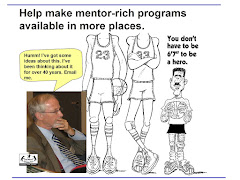I encourage you to read Dawn Turner Trice's story in today's Chicago Tribune. It features a young man, Antwan Turpeau, who had a troubled youth, but who now is leading a non profit called Struggling Youth Equal Successful Adults, SYESA, program.
The feature photo in the story shows Antwan and his long-term mentor, Cliff Bregstone. I met Cliff more than 10 years ago and he has been a supporter of the Tutor/Mentor Connection while using the ideas I share to help him form a program he leads called College Bound Opportunities.
In the Tribune story, Turpeau is quoted as asking "How did we avoid a lot of the pitfalls that former wards fall into?" He answered, "We had mentors who didn't give up on us."
I created this graphic to show that for mentors like Cliff to connect to youth like Antwan, a structured program was needed to create the introduction and support the relationship development until there was a bond that might last for many years into the future.
I use maps to emphasize that structured programs need to be located in every high poverty neighborhoods (and perhaps in non poverty areas, too). I maintain a list of nearly 200 youth serving organizations in the Chicago region who are each connecting youth to adult mentors and tutors (in dramatically different ways). They all need volunteers. They all need people to help them build and maintain effective web sites and training programs. They all need a constant flow of operating dollars to fund this work.
If you've been inspired by the story of Cliff and Antwan, look at this list and choose one, or several programs, and send them a year-end donation.
There's much more that needs to be done to enable mentor-rich programs to reach youth in every high poverty neighborhood of Chicago, and similar cities. I hope you'll form a learning group in your company, faith group, college and/or family, and spend time every week for the next year or two browsing the articles on this blog, the links I point to. Build an involvement strategy based on what you learn, supporting the growth of programs, and the growth of long-term mentoring relationships that lead more young people from troubled youth to adult lives where they can become a contributor to society instead of a cost.
Monday, December 09, 2013
Subscribe to:
Post Comments (Atom)










No comments:
Post a Comment